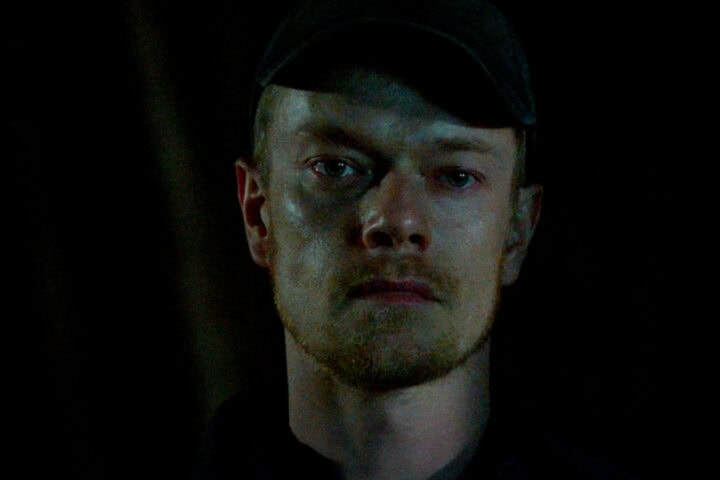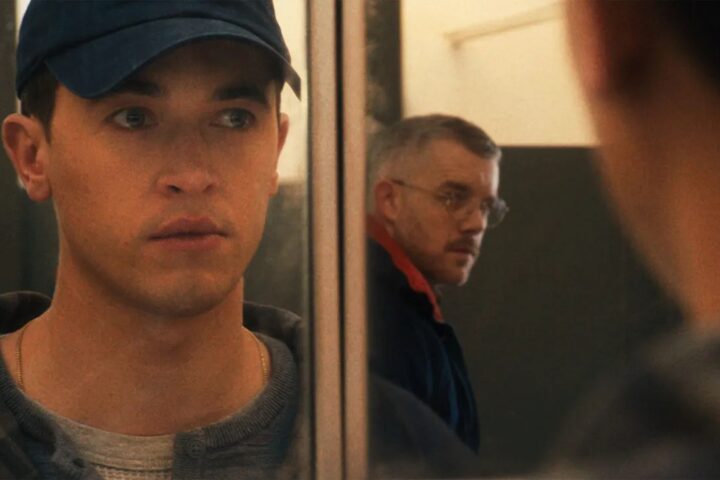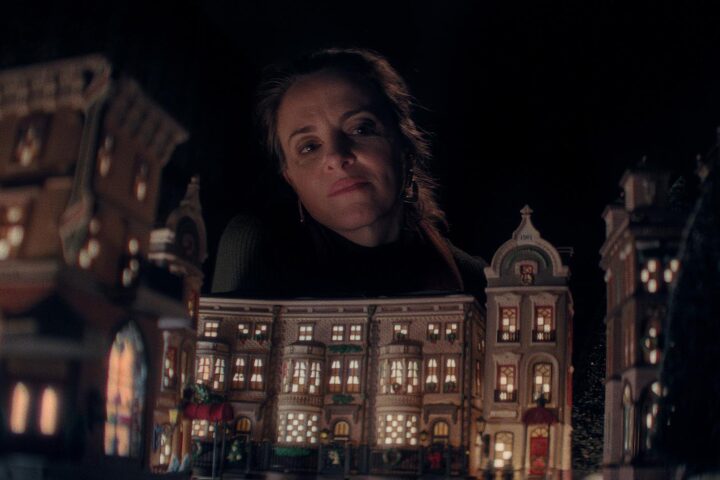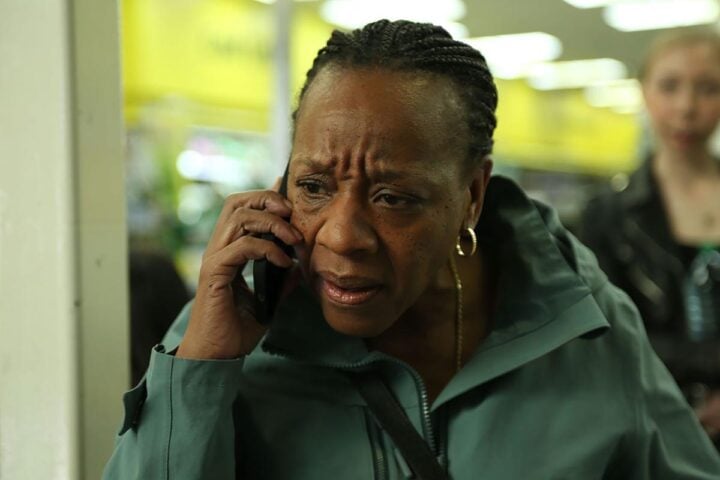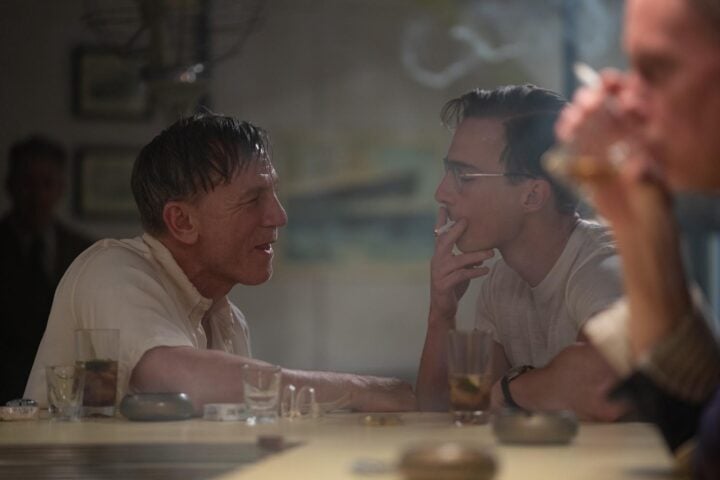Every conceivable trope and tonal variant of a Christmas movie appears to be accounted for in Tyler Taormina’s Christmas Eve in Miller’s Point. There’s a boisterous family gathering, where characters bask in nostalgia. Romances and rivalries abound. Grievances are aired. There’s physical comedy and a crisis that could alter the nature of Christmases to come. Oddball family members who could fit comfortably in a movie as broadly drawn as National Lampoon’s Christmas Vacation mingle freely with those more subtly and melancholically rendered, who might fit in among the atmosphere of Sofia Coppola’s sad and lovely A Very Murray Christmas.
In Taormina’s Ham on Rye, a dance stood in for all coming-of-age rituals in a blend of past and present America. In Christmas Eve in Miller’s Point, holiday tropes born of life and movies alike are exaggerated, parodied, celebrated, and compressed to suggest how our idea of Christmas is a river of memories real and imagined. The film is set on Long Island in the early aughts, but visually, texturally, it feels hyper-real and specific, as well as timeless and artificial. Its gaudy yet beautiful iconography suggests what a view from the inside of a snow globe might look like.
Christmas Eve in Miller’s Point is an ecstatically maximalist carnival that understands that the chief appeal of the holidays, and the movies they’ve inspired, is the vibe—that air of euphoric anticipation that’s laced with the weight of past disappointments. Cinematographer Carson Lund allows colors to bleed together with a messy, earthy warmth that suggests the fond blurring of recollection. This is one of the most visually sumptuous and inventive films of the year: an impressionist painting of Christmas colors, with landscapes that could’ve come out of Norman Rockwell. One composition in particular—of a train rushing by high in the frame as someone skates on a frozen lake below—is heartbreakingly beautiful, allowing you to feel as if nostalgia for the characters is crystallizing on screen in real time.
That nostalgia is laced with a streak of acidity that keeps things from getting too cute. It’s as if we’re witnessing a Christmas party not only from multiple points of view but from various eras. If you’re a teenager, a big to-do with the relatives can be something you long to escape, as Emily (Matilda Fleming) and her cousin, Michelle (Francesca Scorsese) eventually do, but, when you’re older, such things become canon, as this party is for the middle-aged siblings of the Balsano clan: Ray (Tony Savino), Ronald (Steve Alleva), and Emily’s mother, Kathleen (Maria Dizzia). The film fluidly shifts from the teens’ boredom to the adults’ quiet desperation to young children’s excitement, capturing how a holiday party can affirm and drain you in equal measure.
The huge party at the film’s center is among the great parties of recent American cinema. The casting of the warm and vibrant Francesca Scorsese, daughter of Martin Scorsese, and of the sentimental and forlorn Sawyer Spielberg, son of Steven Spielberg, doesn’t feel incidental here, as those filmmakers are pivotal influences on Taormina. The wild momentum of the party, which Taormina and Lund render in rapturous sequences that teem with wild and shifting emotions and explosions of color and sound, suggests the party scenes of Scorsese films like Mean Streets and Goodfellas. And the evocation of innocence affirmed and distorted is reminiscent of Spielberg’s work, particularly of E.T. the Extraterrestrial.
What Taormina brings to the party of his own is a distinctive tone that includes the wry absurdism that was evident in Ham on Rye and Happer’s Comet. It’s as if he distrusts his own nostalgia and its capacity to blinker vision, and this distrust is arising as a governing concern of his filmography so far. (Lund’s own wonderful first feature, Eephus, is driven by similar concerns.) Get caught up in the train set and the lights and M&Ms and the hilariously enormous dessert table and you might miss the aging woman who isn’t talking and who might be witnessing her last Christmas with her family. And, so, Taormina periodically disrupts the spell.
The disruption can be felt in the parodic performances of the actors playing the adult Balsanos. Some of them, especially Savino, are pitched to the rafters, casting everything we’re seeing in a slightly ironic light, yet whose pain registers as vividly as the uncertainty of their children, who are performed realistically. Corresponding to the differing acting styles, many images are transporting, but more than a few are so fetishistic and determined as to be consciously ridiculous, such as a shot of an older woman singing to the ceiling as she stands above a Christmas village. The poignant and straight-faced and ironic and beautiful and absurd elements all inevitably blur together, suggesting the subjective measure we take of our lives.
This blurring impulse is especially evident in the film’s most extraordinary sequence. The Balsano clan puts on VHS tapes of family occasions and the camera does something that we often wish we could do when watching footage of the past: it enters into it, exploring a wedding freely, savoring the nooks and crannies of the space, peaking around corners that the tape itself couldn’t rationally reveal, travelling back in time briefly, benignly. Taormina and Lund open a fissure up in the middle of Christmas Eve in Miller’s Point, collapsing eras the way that we collapse our histories of ourselves when we look back on what we’ve done and how we’ve felt, especially around the holidays. It’s a magic trick worthy of Alain Resnais.
Since 2001, we've brought you uncompromising, candid takes on the world of film, music, television, video games, theater, and more. Independently owned and operated publications like Slant have been hit hard in recent years, but we’re committed to keeping our content free and accessible—meaning no paywalls or fees.
If you like what we do, please consider subscribing to our Patreon or making a donation.


